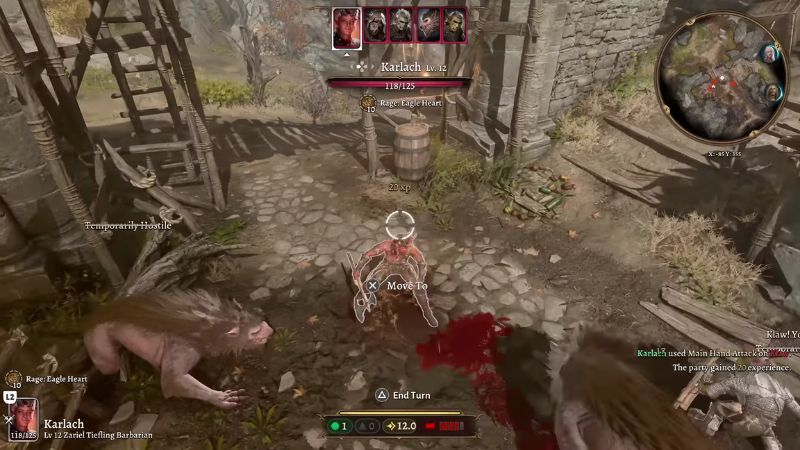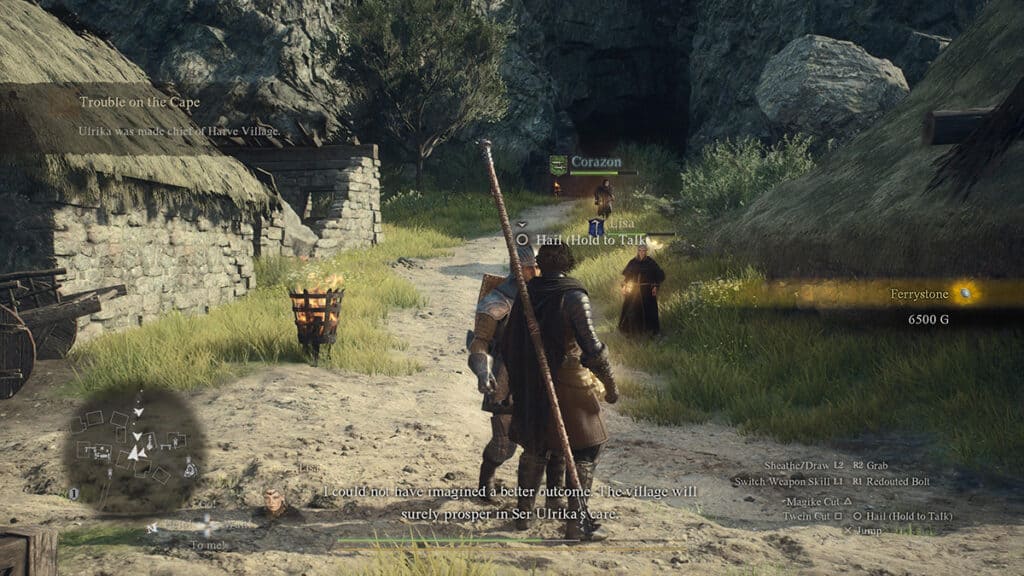Skip To...
It seems like fans of fantasy games have been getting their due with the release of Dragon’s Dogma 2 and Baldur’s Gate 3 so close to one another. Between the two, players can weave their fantasy desires into beautiful narratives with unforgettable characters and plot points. However, there is a clear difference between the two. The differences are so stark that, in many ways, I wouldn’t recommend Dragon’s Dogma 2 for fans of Baldur’s Gate 3 and vice-versa. Whenever I’m asked which one I would recommend and why between the two, it always comes down to which ones provides a better overall experience.
The Battle Between Gameplay

The gameplay for Dragon’s Dogma 2 and Baldur’s Gate 3 couldn’t be more different. The former takes on a third-person perspective and employs real-time combat that I felt wasn’t very fluid. Combat depends on your class—which the game calls vocations—and each of the ten offers a unique gameplay experience based on the weapons you can use. I switched between classes and found myself most interested in the Trickster and Thief because I’m pretty basic.
The physics felt too loose for what I felt would have been natural. I am biased in believing that turn-based combat is the best kind of combat, but Dragon’s Dogma 2’s real-time clumsiness didn’t do it many favors in that regard. Yes, I enjoyed being able to catapult small goblins with a single swing of my daggers. However, climbing up larger enemies and performing any jumping attack felt near impossible and hindered my experience more than it did make it fun. However, I will admit that switching to another vocation as opposed to being locked to a single one did help me over that hump. Even then, I wish I could multiclass rather than be locked to the weapons and equipment of my chosen vocation.
I also took notice of how the game handles cause and effect. Your actions will result in consequences such as imprisonment or death, though neither changes the game’s trajectory or how others view you. Some actions did have dire consequences, like taking on more quests than you can handle. If you mistakenly forgot about a quest and several in-game days have passed, it’s possible to fail it due to taking too long. Even then, the consequences felt incredibly isolated and as though it didn’t matter to the overall story.
Baldur’s Gate 3 differs in that it’s third-person and employs an isometric top-down camera view. The gameplay is completely turn-based and uses the ruleset of Dungeons & Dragons 5th Edition instead of creating a new system or using a real-time strategy. This gameplay is pretty standard across all modern D&D video games, though this is a first for the Baldur’s Gate series. It’s also a first that instead of using a grid to plan out battlefields, you can choose specific locations to walk to and attack from. You’re still provided with the necessary information, such as if the enemy can perform an attack of opportunity, though you have more control over the events.
You can choose from 12 classes and 46 subclasses that can be changed after meeting with Withers in the Dank Crypt. Classes can’t be changed as easily as they can in Dragon’s Dogma 2, though the option to multiclass is there if you want at any time. Baldur’s Gate 3 also pushes you to know about your character’s stats to perform certain acts such as lying, lockpicking, stealing, etc. Those aspects of gameplay don’t matter in the world of Dragon’s Dogma 2 and feel flat compared to its opposition. If you want to open a locked door, you just need to wait until the right time of day to walk in.
Comparing how both games handle consequences, I felt that Dragon’s Dogma 2 fell flat. There are consequences for taking too long to complete a quest, but that was it. Baldur’s Gate 3 made consequences a part of its gameplay, with NPCs taking personal notice of your actions and alignment; even in times of inaction. If you ignore Gale long enough, he will feel isolated and leave the group. That level of consequence never felt present in Dragon’s Dogma 2.
A Friend in Need is a Friend Indeed

One of the biggest differences I noticed between these two games is that you can include those you want at your party. When you first begin, you create a Pawn that travels with you to make the game feel like you’re building up a party in a more natural way. You can use the Pawns of other players as well, making up fun and powerful party combinations. However, the Pawns from other players you use are merely NPCs that have almost no personal connection with you. Even the connection with my own Pawn never felt natural as the story progressed, making the ending feel incredibly strange.
The main Pawn I created—and all other Pawns I used, for that matter—had inconsistent AI. Although having a balanced party is an important part of progressing, I wanted nothing more than to travel with competent Pawns. When they would fall into the Brine and perish, I felt angry that I needed to find a Riftstone to get another Pawn. Sometimes, I wouldn’t revive my main Pawn and traveled without them when they became forfeit. I didn’t feel any genuine party synergy throughout, even though the game tries to have them take you to different locations or talk to you. They’ll even banter with each other to try to make traveling more natural, to no avail.
Baldur’s Gate 3 does an incredible job of making you fall in love with its characters and making memorable moments matter. There was an intense scene in the game in which a shapeshifting incubus used my form to have intercourse with someone without my consent. Astarion came along and comforted me, providing me with a connection to a character that I only wish could have happened in Dragon’s Dogma 2. Baldur’s Gate 3 is chock-full of moments like this, which is expected because of the human connection surrounding how the tabletop game is played.
I also felt that this connection made people who had never played a video game before flock to Baldur’s Gate 3. It reminded me a lot of the peak of the Dragon Age or the Mass Effect series when it became impossible to search for any of the characters online without running into tons of fan drawings of them. Everyone has a Pawn, and while they provide a sense of community, it ultimately doesn’t matter. I didn’t have a connection to my Pawn or others in my party because I knew from the beginning that they were disposable.
Unraveling the Tale-Telling of Two Fantasy Stories

The story within Dragon’s Dogma 2 is rather straightforward for a fantasy-adventure story. You’re chosen by a powerful dragon to be the Arisen and as such, you must defeat said dragon. That’s essentially the entire story; even your final choice solidifies that. The world has other stories in the backdrop, but they don’t intersect with your goal of slaying the dragon in the grand scheme of things.
While it is my fault for spending nearly 30 hours initially just exploring, that decision made me realize how bland Dragon’s Dogma 2 is without a quest goal or location in mind. The overworld is beautiful and can be interesting to traverse, but in doing so, the story never hit a mark that felt fun or interesting. Going through each quest is another story, but traversal in an exploratory way didn’t feel fun. I believe more randomized encounters could have helped this. This also fueled my opinion that nothing mattered until the hours leading up to the end. In many ways, I chose which ending I wanted when the time came. Did I want a good, bad, or true ending? I just made a pick.
Baldur’s Gate 3‘s story feels like an actual story with a beginning, middle, and end. Where Dragon’s Dogma 2 made me feel like I was traversing through a world whose story was in the background, Baldur’s Gate 3 pulled me in. The different NPC’s and party members that you met all have a connection with the world beyond hanging out with you. Do you want to help Astarion find Cazador Szarr while also on the path to discovering why you had a parasite implanted while simultaneously trying to amend your relationship with Gale? Everything I did felt important, and even the larger decisions, like what to do with Karlach or Isobel, changed everyone in the game’s perspective of me.
The ending didn’t make me feel like I had to choose since it culminated all my past decisions. I effectively decided my fate with every choice I made leading up to the moment. I was delightfully surprised when my decision between Orpheus and the Emperor was important to the final battle.
Final Verdict: Baldur’s Gate 3 is Better

Baldur’s Gate 3 is a far more appealing game than Dragon’s Dogma 2. The former gave me a much more memorable experience that genuinely relied on how I played the game. I didn’t realize how little Dragon’s Dogma 2 has to do with you as a player, so much as with the character being the Arisen. Knowing that decisions and conversations mattered to the overall experience of Baldur’s Gate 3 makes it the clear winner for me between these two. When comparing it to how I felt playing through Dragon’s Dogma 2. That doesn’t make it a bad game, but it does make it a game that’s less approachable or diverse in comparison.
Baldur’s Gate 3 set a precedent within the RPG community that makes it difficult for other games to compete. Its voice acting, quests, locations, and general writing are simply leagues better than anything you could experience in Dragon’s Dogma 2. It comes down to what your personal preference in games is, but the answer to which is the best is pretty clear: Baldur’s Gate 3.
Baldur’s Gate 3 and Dragon’s Dogma 2 are available on PlayStation,







